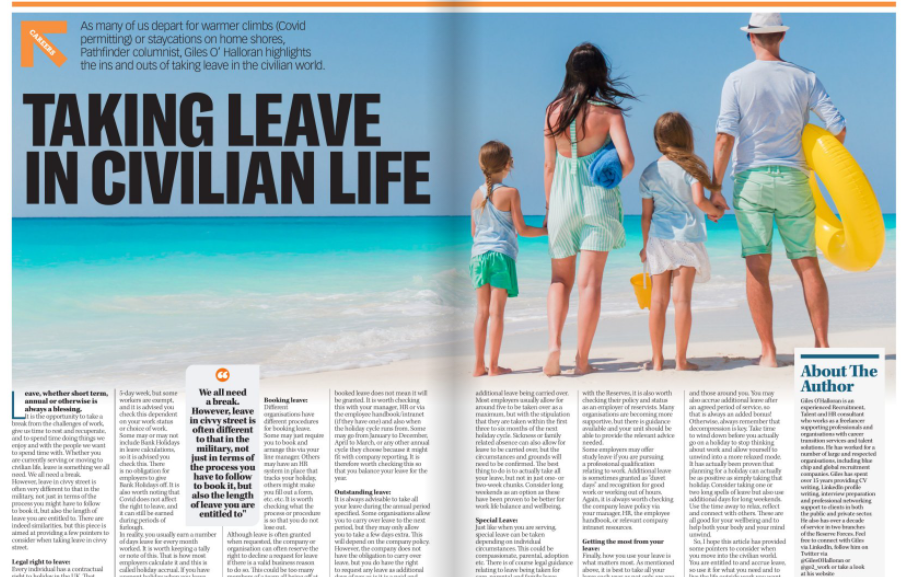
As many of us depart for warmer climbs (Covid permitting) or staycations on home shores, Pathfinder columnist, Giles O’ Halloran highlights the ins and outs of taking leave in the civilian world.
Leave, whether short term, annual or otherwise is always a blessing. It is the opportunity to take a break from the challenges of work, give us time to rest and recuperate, and to spend time doing things we enjoy and with the people we want to spend time with. Whether you are currently serving or moving to civilian life, leave is something we all need. We all need a break.
However, leave in civvy street is often very different to that in the military, not just in terms of the process you might have to follow to book it, but also the length of leave you are entitled to. There are indeed similarities, but this piece is aimed at providing a few pointers to consider when taking leave in civvy street.
Legal right to leave:
Every individual has a contractual right to holiday in the UK. That statutory minimum is 28 days (5.6 weeks) if you work a standard 5-day week, but some workers are exempt, and it is advised you check this dependent on your work status or choice of work. Some may or may not include Bank Holidays in leave calculations, so it is advised you check this. There is no obligation for employers to give Bank Holidays off. It is also worth noting that Covid does not affect the right to leave, and it can still be earned during periods of furlough.
In reality, you usually earn a number of days leave for every month worked. It is worth keeping a tally or note of this. That is how most employers calculate it and this is called holiday accrual. If you have unspent holiday when you leave employment, this can be taken as part of notice or even paid.
Booking leave:
Different organisations have different procedures for booking leave. Some may just require you to book and arrange this via your line manager. Others may have an HR system in place that tracks your holiday, others might make you fill out a form, etc. etc. It is worth checking what the process or procedure is so that you do not lose out.
Although leave is often granted when requested, the company or organisation can often reserve the right to decline a request for leave if there is a valid business reason to do so. This could be too many members of a team all being off at the same time, periods of urgent work etc. Just because you have booked leave does not mean it will be granted. It is worth checking this with your manager, HR or via the employee handbook/intranet (if they have one) and also when the holiday cycle runs from. Some may go from January to December, April to March, or any other annual cycle they choose because it might fit with company reporting. It is therefore worth checking this so that you balance your leave for the year.
Outstanding leave:
It is always advisable to take all your leave during the annual period specified. Some organisations allow you to carry over leave to the next period, but they may only allow you to take a few days extra. This will depend on the company policy. However, the company does not have the obligation to carry over leave, but you do have the right to request any leave as additional days of pay as is it is a paid and contractual benefit. If they fail to do so, you have the right to that additional leave being carried over.
Most employers usually allow for around five to be taken over as a maximum, but with the stipulation that they are taken within the first three to six months of the next holiday cycle. Sickness or family related absence can also allow for leave to be carried over, but the circumstances and grounds will need to be confirmed. The best thing to do is to actually take all your leave, but not in just one- or two-week chunks. Consider long weekends as an option as these have been proven to be better for work life balance and wellbeing.
Special Leave:
Just like when you are serving, special leave can be taken depending on individual circumstances. This could be compassionate, parental, adoption etc. There is of course legal guidance relating to leave being taken for care, parental and family leave, but some employers are willing to go beyond this. If you opt to serve with the Reserves, it is also worth checking their policy and status as an employer of reservists. Many organisations are becoming more supportive, but there is guidance available and your unit should be able to provide the relevant advice needed.
Some employers may offer study leave if you are pursuing a professional qualification relating to work. Additional leave is sometimes granted as “duvet days” and recognition for good work or working out of hours. Again, it is always worth checking the company leave policy via your manager, HR, the employee handbook, or relevant company intranet resources.
Getting the most from your leave:
Finally, how you use your leave is what matters most. As mentioned above, it is best to take all your leave each year as not only are you entitled to it, but it is also simply good for you, your wellbeing and those around you. You may also accrue additional leave after an agreed period of service, so that is always an added bonus! Otherwise, always remember that decompression is key. Take time to wind down before you actually go on a holiday to stop thinking about work and allow yourself to unwind into a more relaxed mode. It has actually been proven that planning for a holiday can actually be as positive as simply taking that holiday. Consider taking one or two long spells of leave but also use additional days for long weekends. Use the time away to relax, reflect and connect with others. These are all good for your wellbeing and to help both your body and your mind unwind.
So, I hope this article has provided some pointers to consider when you move into the civilian world. You are entitled to and accrue leave, so use it for what you need and to live the life outside work you want. It is best for your wellbeing and let’s face it – you’ve earned it!

